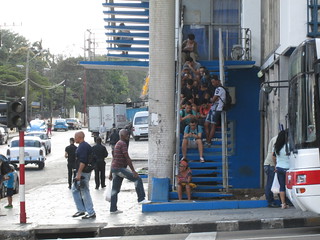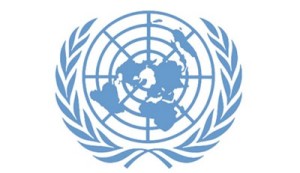I went to Havana, Cuba in February. It’s been a life-long dream, and I’m so glad that I had the resources and professional profile to go at last – and before the country undergoes the anticipated massive changes that will come with normalization of relations with the USA – I hope to get to go again to see what those changes lead to.
A shock for me on my trip was that, other than just before the airport departure gates, I never saw an Internet public access center. I had heard they had them, at least for youth, but I didn’t see any. For instance, the Wikipedia.org español entry for Internet en Cuba says:
En 2009 el gobierno permitió el libre acceso a Internet en las oficinas de correos y el pasado año 2013 se abrieron 118 salas de navegación en todo el país, que se unen a los más de 600 joven clubs de computación y electrónica que funcionan en la Isla.
My translation: In 2009 the government allowed free access to the Internet in post offices and in 2013, 118 Internet access rooms or centers were opened throughout the country, used by more than 600 young computer and electronic clubs that operate on the island .
What I did see, more often at night, were groups of people tightly huddled together on steps and walls outside of hotels, phone and computer stores, and the offices of the Cuba Internet provider, with their laptops and smart phones, all looking at screens, some talking on Skype.
This photo is in the daytime, obviously, outside the Habana Libre hotel.:
Internet access here at this hotel, or any other, is not free – they had to pay for this access, just as we did for an hour or two at the same place, but we got to sit in an air-conditioned lobby, even though we weren’t staying at that hotel – they didn’t. I have a feeling this situation is going to change rapidly and community technology centers, and better in-home Internet
I have a feeling this situation is going to change rapidly and community technology centers, and better in-home Internet. My casa particular host will be so happy – she has to beg her guests to never, ever send her any attachments to email to her – she just doesn’t have the bandwidth.
Which reminds me: the Community Technology Network, based in San Francisco, California, USA, is leading a delegation to Cuba in April. “This will be a unique opportunity to observe Cuba at a pivotal point in time as its government, NGOs, and social institutions work together to close their digital divide.” More info about the trip here – it includes information on organizations working towards digital empowerment in Cuba.
I picked up some UN materials at their booth at the Havana book festival – didn’t find any UN staff members to talk to (they may have been there, but the crowds and chaos were overwhelming). The UN info has details on several topics I’m heavily interested in, like public health and women’s empowerment in Cuba, but nothing on digital literacy efforts the UN might be undertaking. I’ll be watching the United Nations Online Volunteering Service closely, hoping that opportunities to support Cuban organizations will start to become plentiful. In addition, I’ll be doing these searches periodically to see what comes up: Brecha Digital e Inclusión Social Cuba, Software Libre Cuba, Internet Tecnología Cuba, penetración a la red Cuba, red social and tech ayuda Cuba.
Some resources I’ve found as a result so far:
- VII International Symposium on Telecommunications, March 16- 17, 2016, at the Convention Center in Havana, as part of the International Convention and Fair “Informática 2016”.
- Intranets, repositorios, alfabetización digital e informacional… (PDF): Estrategias cubanas para evitar la brecha digital, replicables y adaptables en otros contextos iberoamericanos
- The Internet in Cuba – blog as a small effort to encourage the modernization of and access to the Internet in Cuba.”
- A blunt review in Spanish of what “free” Internet access is like in Havana, from July 2014, by Orlando Delgado via Diario de Cuba
- Generation Y, an extremely popular blog by Cuban Yoani Sanchez. The blog “lets me say, in this space, what is forbidden to me in my civic action.” My favorite blog of hers (so far), is: Cuba: In The Country of Solidarity, There Are No Foreigners
- A good background article in Spanish from the BBC regarding the Internet situation in Cuba before September 2009.
And one more thing, off-topic for the digital divide, but it’s a cause near and dear to my heart: I did a lot of research once I was back in the states to find an NGO working to help the situation for dogs and cats in Cuba, because the situation for them is heart-breaking. I found The Aniplant Project, Inc. (TAP), a nonprofit in the USA dedicated to the protection of animals, and its primary activity is to support Aniplant (Asociación Cubana para la Protección de Animales y Plantas) of Havana Cuba. Aniplant is not part of the Cuban government and receives no financial help from that government, but it is the only animal protection organization permitted to function in Cuba. Aniplant’s HQ is in Havana, but it provides services throughout most parts of Cuba. In 2014 Aniplant sterilized over 5,000 dogs and cats in its traveling weekend clinics which move throughout the country. I’ve made a small donation to TAP in support of dogs and cats in Cuba, and I so, so hope you will do the same, and like their Facebook page, to stay up-to-date on their work.
Additions later on the day of this blog’s publication:
In conjunction with the June 2015 seminar on “Socialist Renewal and the Crisis of Capitalism” at the University of Havana, Peter Miller developed a 2-page community technology proposal that was the conclusion to his presentation there , an effort to develop an alternative rootsofhope-type technology assistance demo or project in collaboration with, even under the guidance of, officially recognized Cuban institutions and nongovernmental organizations. “It seemed pretty obvious to me that, no matter what one’s politics, that’s the collegial way to begin in the spirit of rapproachment that we share.”
“Che Guevara and ICT4D in Cuba,” a December 17th anniversary summary of follow-up research, brought to my attention by this blog by Peter Miller. This draft consists of four or five parts, beginning with its titled introductory section, slightly revised and formatted as a short paper submission for the June 3-6 ICTD conference in Ann Arbor, Michigan (ictd2016.info). Miller says, “This brief summary of Che Guevara’s little-known contribution to the field provides a frame of reference for looking more closely at some more recent and current examples of ICT4D in Cuba — collaborative projects and studies involving inter-university ICT capacity building and Open Source, and problematic U.S.-based governmental and nonprofit “’community development’ technology efforts involving USAID and the Alan Gross and ZunZuneo fiascos, and Roots of Hope and the Hackathon for Cuba.”


